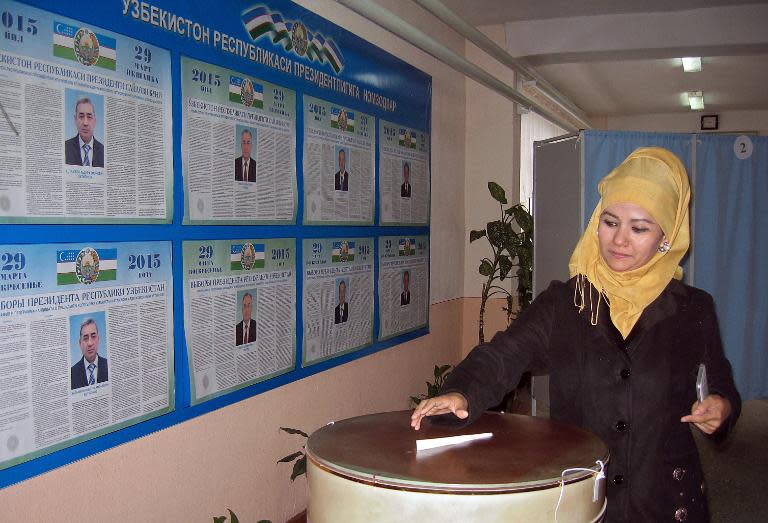Uzbek strongman re-elected in landslide, OSCE dubious
Uzbek strongman Islam Karimov cruised to a new five-year term Monday after facing a minimal challenge, prompting withering criticism from Western observers. The election commission in the tightly controlled Central Asian state said Karimov, 77, won more than 90 percent of the vote in Sunday's presidential election to extend his 25 years in power, with voter turnout reaching 91 percent. None of the three challengers -- all fielded by parties that are openly supportive of Karimov's rule -- troubled the incumbent, scoring in the single digits. His closest challenger, Akmal Saidov, who is well-known for defending the former Soviet republic's often criticised human rights record, won less than four percent of the vote. Karimov has led the most populous of Central Asia's five former Soviet republics since 1989, two years before collapse of the Soviet Union. The Organization for Security and Cooperation in Europe (OSCE) questioned the independence of the electoral commission, noting that Karimov's candidacy breached constitutional term limits. "Despite a clear constitutional limit of two consecutive presidential terms, the Central Election Commission registered the incumbent as a candidate," Tana de Zulueta, head of the OSCE observer mission, said in a statement Monday. "This was in contravention of the rule of law and raises doubts about the commission’s independence," she said. The OSCE mission also noted irregularities including widespread use of proxy voting and said Karimov faced no real competition. "The figure of the incumbent dominated a political landscape without genuine opposition," it said. - Putin congratulates - Karimov's low-key campaign emphasised his need to maintain firm control to ensure stability in the country of more than 30 million that borders Afghanistan and counts Russia, China and the West among its strategic partners. Voters in Tashkent overwhelmingly stressed security in explaining why they voted for Karimov, and the strongman's re-election is unlikely to dispel fears about what will happen in Uzbekistan after his rule. Rumours of physical frailty have dogged the long-time leader, although Karimov appeared healthy when dancing at a recent state celebration marking the beginning of spring. Russia, where more than two million Uzbek migrants work according to the Federal Migration Service, rushed to congratulate Karimov. Russian President Vladimir Putin said his victory "confirmed (his) high standing" among the Uzbek electorate, according to a statement released by the Kremlin minutes after the central election commission's announcement. While Russia is a key trade partner for Uzbekistan, the country exited a security alliance headed by Moscow in 2012 and is reportedly concerned about Russia's muscular policies towards Ukraine, keeping its distance from Putin's pet integration project, the Eurasian Economic Union. "I promise you Uzbekistan will never join such blocs aimed at bringing back old times with a bigger brother. Today Uzbekistan has its firm geopolitical position and we no longer listen to others," Karimov reportedly told voters at a small meeting before the election. Despite Western criticism of the country's human rights record over the years, Uzbekistan has also been a key partner to the United States in its military operations in Afghanistan, providing a hub for troop supply via land and air. Perhaps the country's warmest relations are with China, with which Uzbekistan signed deals worth a reported $15 billion in 2013, and whose stated policy of non-interference in the sovereign affairs of other countries is well suited to Karimov. "Tashkent quickly changes its orientations and partners if deems that cooperation has become disadvantageous," wrote Russia's Vedomosti newspaper as the poll wrapped up on Sunday. The presidential vote completed a political cycle for the double-landlocked country after parliamentary elections -- which also enjoyed a turnout of more than 90 percent, according to official figures -- in December.

 Yahoo Finance
Yahoo Finance 


